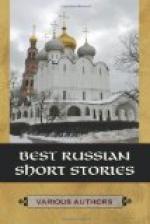And that was the truth. In his eyes shone moon and sun. But he could not transmit the radiance to marble. Therein lay the greatest tragedy of his life. He was a descendant of an ancient race of patricians, had a good wife and children, and except in this one respect, lacked nothing.
When the dark rumour about Lazarus reached him, he consulted his wife and friends and decided to make the long voyage to Judea, in order that he might look upon the man miraculously raised from the dead. He felt lonely in those days and hoped on the way to renew his jaded energies. What they told him about Lazarus did not frighten him. He had meditated much upon death. He did not like it, nor did he like those who tried to harmonise it with life. On this side, beautiful life; on the other, mysterious death, he reasoned, and no better lot could befall a man than to live—to enjoy life and the beauty of living. And he already had conceived a desire to convince Lazarus of the truth of this view and to return his soul to life even as his body had been returned. This task did not appear impossible, for the reports about Lazarus, fearsome and strange as they were, did not tell the whole truth about him, but only carried a vague warning against something awful.
Lazarus was getting up from a stone to follow in the path of the setting sun, on the evening when the rich Roman, accompanied by an armed slave, approached him, and in a ringing voice called to him: “Lazarus!”
Lazarus saw a proud and beautiful face, made radiant by fame, and white garments and precious jewels shining in the sunlight. The ruddy rays of the sun lent to the head and face a likeness to dimly shining bronze—that was what Lazarus saw. He sank back to his seat obediently, and wearily lowered his eyes.
“It is true you are not beautiful, my poor Lazarus,” said the Roman quietly, playing with his gold chain. “You are even frightful, my poor friend; and death was not lazy the day when you so carelessly fell into its arms. But you are as fat as a barrel, and ’Fat people are not bad,’ as the great Caesar said. I do not understand why people are so afraid of you. You will permit me to stay with you over night? It is already late, and I have no abode.”
Nobody had ever asked Lazarus to be allowed to pass the night with him.
“I have no bed,” said he.
“I am somewhat of a warrior and can sleep sitting,” replied the Roman. “We shall make a light.”
“I have no light.”
“Then we will converse in the darkness like two friends. I suppose you have some wine?”
“I have no wine.”
The Roman laughed.
“Now I understand why you are so gloomy and why you do not like your second life. No wine? Well, we shall do without. You know there are words that go to one’s head even as Falernian wine.”
With a motion of his head he dismissed the slave, and they were alone. And again the sculptor spoke, but it seemed as though the sinking sun had penetrated into his words. They faded, pale and empty, as if trembling on weak feet, as if slipping and falling, drunk with the wine of anguish and despair. And black chasms appeared between the two men—like remote hints of vast emptiness and vast darkness.




